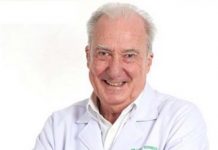We all have much to thank our parents for. Just letting us grow up for starters. As an aside, if my young son continues much longer with the two year old tantrums, he’s going to be lucky to reach his third birthday, but no doubt his mother will shield him from paternal wrath.
 However, heredity is one of the ‘clues’ to your health in the future, and what you can do to enjoy a long, lively and healthy one. This is where ‘thanks Mum and Dad’ comes in. One problem of being an orphan is that it leaves the person with no idea as to what ailments are going to befall them. Dad might have legged it or ‘fled the scene’, but did he live to tell the tale when he was 60?
However, heredity is one of the ‘clues’ to your health in the future, and what you can do to enjoy a long, lively and healthy one. This is where ‘thanks Mum and Dad’ comes in. One problem of being an orphan is that it leaves the person with no idea as to what ailments are going to befall them. Dad might have legged it or ‘fled the scene’, but did he live to tell the tale when he was 60?
With the increasing research into genetics, we are able to map out our likely futures and can predict such ailments as diabetes, epilepsy and other neurological problems like Huntington’s Chorea and Alzheimer’s Disease, some cancers such as breast, ovarian, lower bowel, prostate, skin and testicular, heart attacks, blood pressure problems, certain blood diseases like Sickle Cell anemia and so the list goes on.
However, you do not need to have multi-million baht examinations done on your DNA to see where you are headed, all you need to do is to start asking the older family members about your inheritance. Not the money – your genetic inheritance in the health stakes.
Have you ever wondered why the questionnaire for life insurance asks whether any close member of your family has ever suffered from diabetes, epilepsy and other ailments and then also asks you to write down how old your parents or brothers and sisters were when they died, and what they died from? All that they, the insurance companies, are doing is finding out the relative likelihood (or ‘risk’) of your succumbing early to an easily identifiable disease. This does not need a postgraduate Masters degree in rocket science. It needs a cursory application of family history.
If either of your parents had diabetes, your elder brother has diabetes, your younger brother has diabetes and your cousin has diabetes, what are the odds on your getting (or already having) diabetes? Again this is not rocket science. The answer is pretty damn high! And yet, I see families like this, where the individual members are totally surprised and amazed when they fall ill, go to hospital, and diabetes is diagnosed.
It does not really take very much time over a family lunch to begin to enquire about one’s forebears. After five minutes it will be obvious if there is some kind of common medical thread running through your family. That thread may not necessarily be life threatening, but could be something like arthritis for example.
Look at it this way – your future is being displayed by your family’s past. This could be considered frightening, when your father, his brother and your grandfather all died very early from heart attacks. Or, this could be considered as life saving, if it pushes you towards looking at you own cardiac health and overcoming an apparently disastrous medical history.
This is an advantage that you get provided you are not an orphan. You know what to look for before it becomes a problem. Going back to the family with diabetes, what should the younger members do? Well, if it were me, I would be having my blood sugar checked at least once a year from the age of 20. Any time I had reason to visit the doctor in between, I would also ask to have the level checked. We are talking about a very inexpensive test that could literally save you millions of baht in the future, as well as giving you a better quality of life, and a longer one.
Ask around the dinner table today and plan to check your medical future tomorrow. It’s called a ‘Check-up’!





